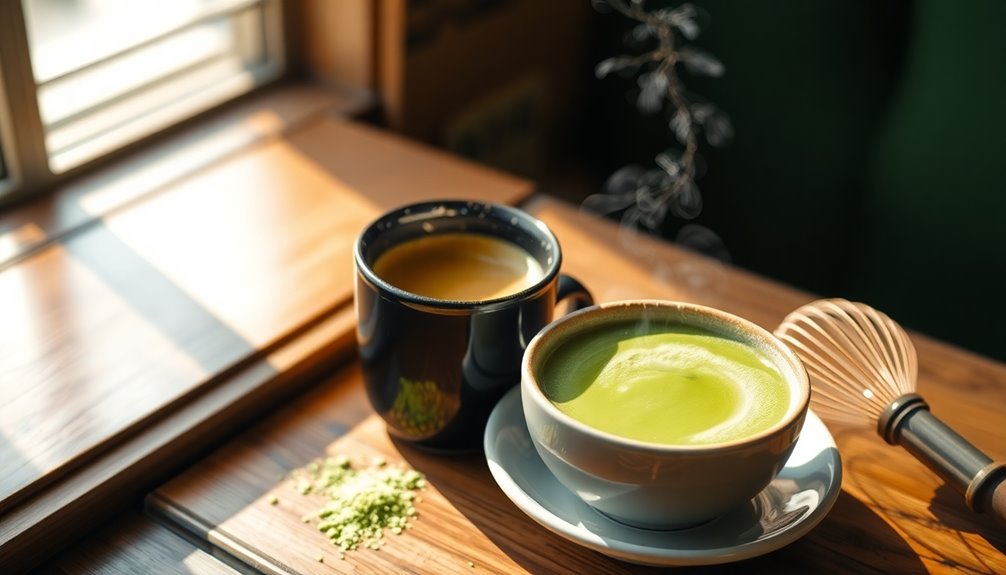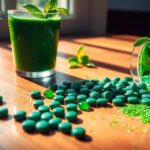When it comes to energy, matcha and coffee offer different experiences. Coffee packs about 95 mg of caffeine per cup, delivering a quick energy surge perfect for short tasks. Conversely, matcha has around 70 mg of caffeine and combines it with L-theanine, leading to a more gradual and relaxing energy boost. This makes matcha better for sustained focus and reducing fatigue during longer activities. Both drinks have unique health benefits, so consider your lifestyle and preferences. Understanding these differences can help you choose the right beverage for your energy needs, and you'll discover even more insights ahead.
Key Takeaways
- Coffee offers a quick energy boost due to faster caffeine absorption, making it ideal for immediate alertness.
- Matcha provides a gradual energy release combined with L-theanine, promoting calmness and sustained focus.
- Both beverages have unique health benefits; matcha is rich in antioxidants, while coffee supports metabolism and heart health.
- Coffee enhances short bursts of physical exertion, whereas matcha helps reduce fatigue during prolonged activities.
- Personal preference, tolerance levels, and desired energy experiences should guide the choice between matcha and coffee.
Overview of Matcha
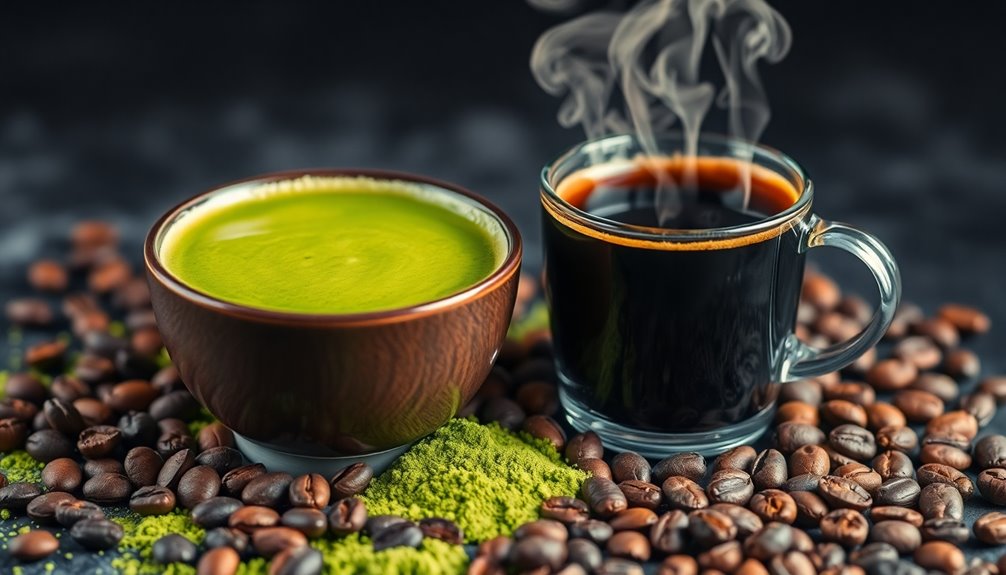
When it comes to energy-boosting beverages, matcha stands out as a unique option that blends tradition with modern health trends. This finely ground green tea powder hails from Japan and offers a distinct flavor profile along with impressive health benefits, making it a popular choice among wellness enthusiasts.
One of the key highlights of matcha is its antioxidant benefits. It's packed with catechins, particularly EGCG, which are known to help combat oxidative stress and promote overall health. These antioxidants can support your immune system and may even enhance your metabolic rate, helping you feel more energized throughout the day.
Preparation methods for matcha can vary, and this versatility allows you to enjoy it in different ways. The traditional method involves whisking matcha powder with hot water using a bamboo whisk, creating a frothy and vibrant drink.
You can also experiment by adding it to smoothies, lattes, or baked goods, which makes it easy to incorporate into your daily routine. In fact, adding matcha to your smoothies can provide a balanced mix of fats, protein, carbs that supports energy levels and overall wellness.
Whether you're sipping it in a quiet moment or sharing it with friends, matcha offers a sense of connection to a rich cultural heritage. As you explore its unique flavors and health benefits, you'll find that matcha not only energizes you but also fosters a sense of belonging within the growing community of matcha enthusiasts. Embracing this beverage can be a delightful way to enhance your wellness journey.
Overview of Coffee
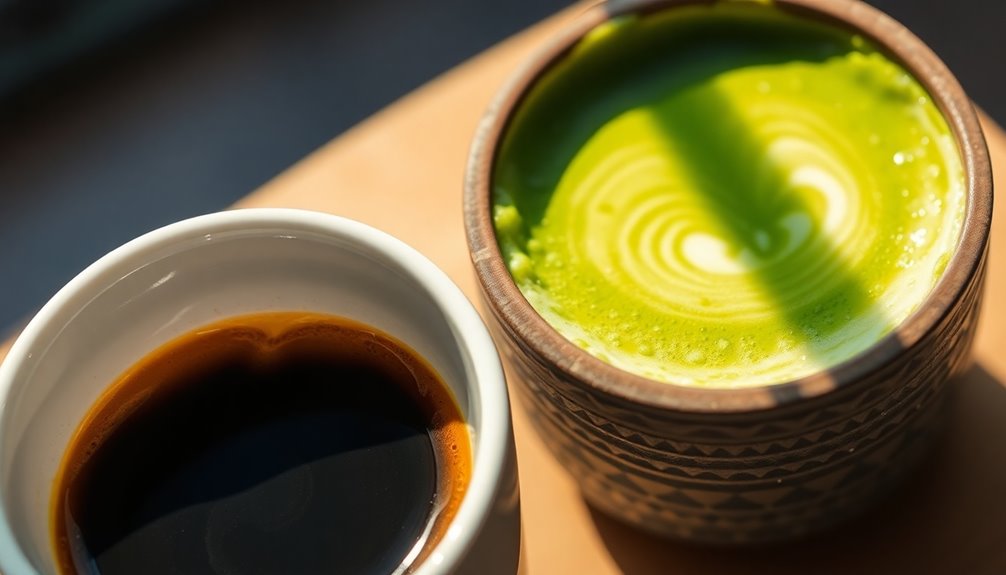
Coffee has long been a staple in many cultures, celebrated for its rich flavor and invigorating properties. It's more than just a drink; it's a social experience that brings people together. The variety of brewing methods available allows you to customize your coffee experience to suit your taste. Whether you prefer a classic drip brew, a robust French press, or a sleek espresso, each method extracts unique flavor profiles that can elevate your mood and energize your day.
The flavor profiles of coffee are vast and diverse, ranging from fruity and floral to nutty and chocolaty. Factors like the origin of the beans, the roast level, and the brewing technique all play significant roles in shaping the taste. For instance, lighter roasts often showcase bright acidity and complex flavors, while darker roasts tend to deliver a bolder, richer taste with a lower acidity. This variety means there's a perfect cup for everyone, whether you're a casual drinker or a connoisseur.
Moreover, the communal aspect of coffee culture fosters connections. You might find yourself in a cozy café, sharing a cup with a friend or enjoying a moment of solitude with your favorite brew. This shared experience can create a sense of belonging, making coffee not just a beverage, but an essential part of your daily routine. Additionally, the health risks associated with snoring and sleep apnea can negatively impact your overall energy levels, highlighting the importance of finding effective solutions for uninterrupted sleep.
Ultimately, understanding the nuances of coffee can enhance your appreciation, allowing you to explore and enjoy each cup fully.
Caffeine Content Comparison
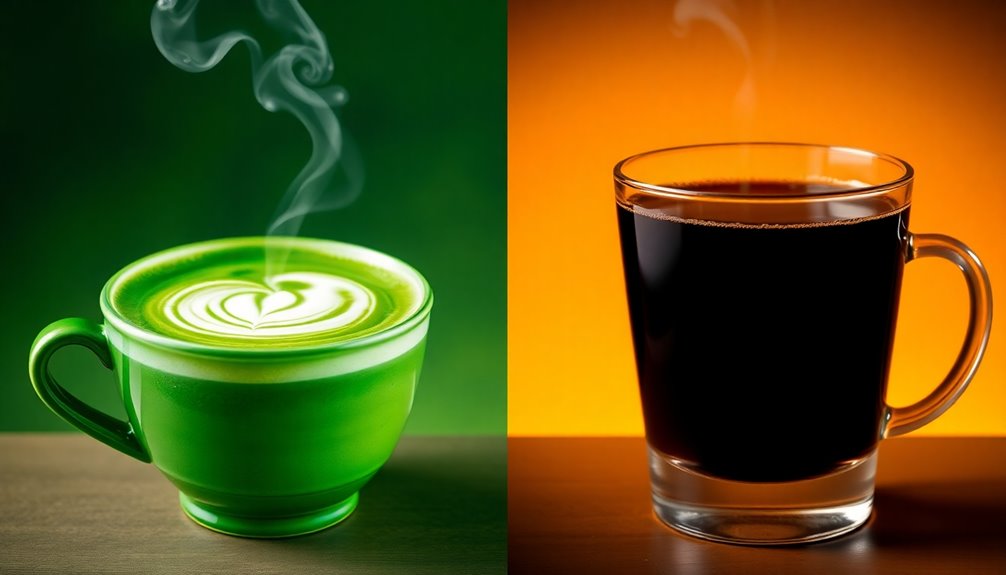
Understanding the caffeine content in matcha and coffee can help you make informed choices about your energy boosts. Both beverages offer unique experiences due to their varying caffeine levels and absorption rates.
A typical cup of coffee contains about 95 mg of caffeine, while a serving of matcha, which is roughly equivalent to one teaspoon of powder, contains around 70 mg. While coffee gives you a quick jolt, matcha's caffeine is paired with L-theanine, which promotes calmness and focus.
When you consume caffeine, how quickly it enters your bloodstream matters. Coffee tends to lead to faster caffeine absorption, providing a rapid energy boost. This quick lift can be appealing, but it often results in an energy crash later, leaving you feeling drained.
In contrast, matcha's unique composition allows for slower caffeine release, which may help you maintain energy levels without the sharp drop-off associated with coffee. Alcoholism affects millions globally, highlighting the importance of making mindful choices about energy sources and overall health.
It's also worth noting that the energy experience can vary based on individual tolerance levels and consumption habits. Some people thrive on coffee's immediacy, while others may prefer the sustained, mellow energy from matcha. Ultimately, understanding these differences can empower you to choose the right beverage for your needs. Whether you opt for the robust kick of coffee or the gentle uplift of matcha, being mindful of caffeine content and absorption will help you navigate your energy choices more effectively.
Energy Release Mechanisms
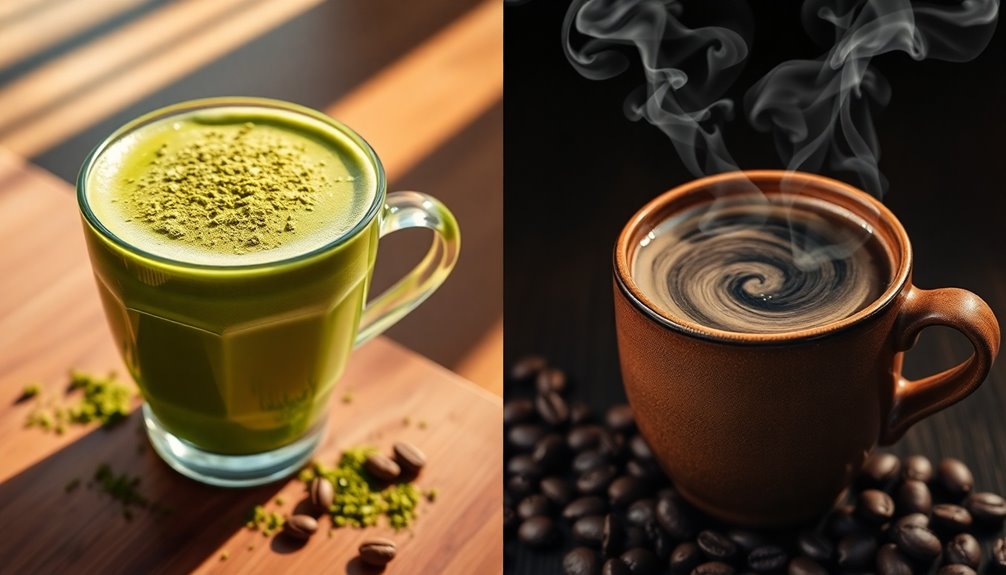
The way energy is released in the body after consuming matcha or coffee greatly influences how you feel throughout the day. Both beverages interact with your metabolic processes, but they do so in distinct ways that can lead to different energy experiences.
When you drink coffee, the caffeine quickly binds to your adenosine receptors, blocking them and preventing feelings of fatigue. This can lead to a rapid boost in energy, but it often comes with a crash as your body metabolizes the caffeine.
On the other hand, matcha contains a unique combination of caffeine and L-theanine, which creates a more gradual energy release. This means you might feel more focused and alert without the jitteriness that coffee can induce.
Imagine the differences in energy release:
- Coffee: A sharp, immediate spike that can feel exhilarating.
- Matcha: A smooth, sustained wave that promotes calm alertness.
- Your body: Responding uniquely to each beverage, influencing your productivity and mood.
With coffee, you might experience a surge followed by a quick drop, while matcha's synergy of caffeine and L-theanine supports prolonged energy, stabilizing your metabolic processes. Additionally, understanding your body's natural calorie intake can also play a significant role in how effectively you harness energy from these beverages.
Health Benefits of Matcha
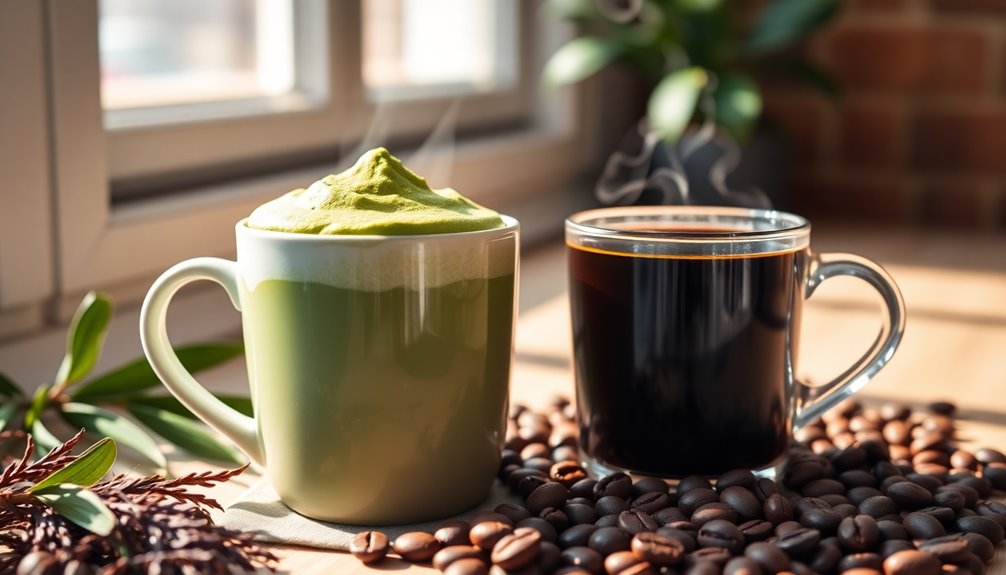
Many people are discovering the impressive health benefits of matcha, which go beyond its unique energy-boosting properties. One of the standout features of matcha is its high antioxidant content. Antioxidants are essential for neutralizing free radicals in your body, which can help reduce oxidative stress and lower the risk of chronic diseases. In fact, matcha contains a specific type of antioxidant known as catechins, particularly epigallocatechin gallate (EGCG), which has been linked to various health benefits, including improved heart health and enhanced brain function.
If you're looking to manage your weight, matcha can also play a supportive role. The catechins in matcha may help boost your metabolism and increase fat oxidation, making it a great addition to a balanced weight management plan. It can complement your exercise routine and healthy eating habits, giving you that extra advantage without the jitters often associated with coffee.
Moreover, the calming effect of L-theanine, an amino acid found in matcha, can promote relaxation and focus, which might help you make better food choices throughout the day. With these combined benefits, matcha isn't just a beverage; it's a holistic approach to wellness that aligns well with your lifestyle goals. Additionally, maintaining a healthy liver is crucial as it performs over 500 vital functions, including regulating hormones that can impact your overall well-being.
Health Benefits of Coffee
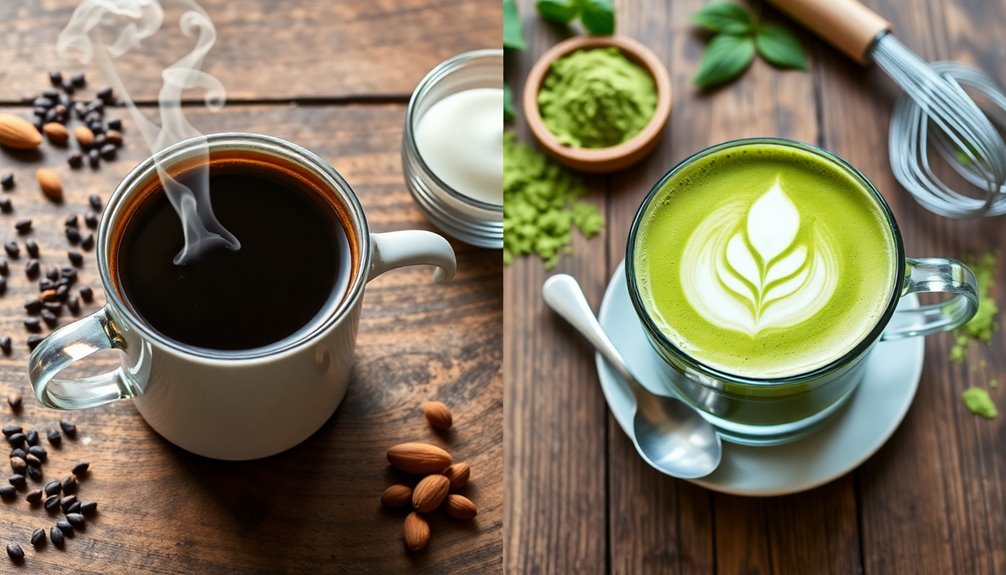
While you might think of coffee primarily as a morning pick-me-up, it actually offers a range of health benefits that can enhance your overall well-being. Studies have shown that coffee is packed with antioxidants, which help combat oxidative stress in your body. This means that enjoying your daily cup not only wakes you up but can also protect your cells from damage.
Here are a few key health benefits of coffee:
- Boosts Metabolism: The caffeine in coffee can increase your metabolic rate, helping you burn more calories throughout the day.
- Supports Weight Loss: Regular coffee consumption may contribute to weight loss benefits by enhancing fat burning during exercise and reducing appetite.
- Rich in Nutrients: Coffee is a source of essential nutrients like B vitamins, potassium, and riboflavin, which are crucial for your overall health.
Moreover, the antioxidant properties of coffee support heart health and may lower the risk of certain diseases, such as type 2 diabetes and Parkinson's. This makes coffee not just a beloved beverage but also a potential ally in your wellness journey. Additionally, research from Emory University School of Medicine suggests that coffee consumption may also be linked to improved cognitive function over time.
When you savor that warm cup in the morning or during a break, know that you're not only enjoying a delightful ritual but also reaping health benefits that can contribute to a healthier lifestyle. So, go ahead and indulge in your favorite brew—your body will thank you!
Impact on Mental Performance
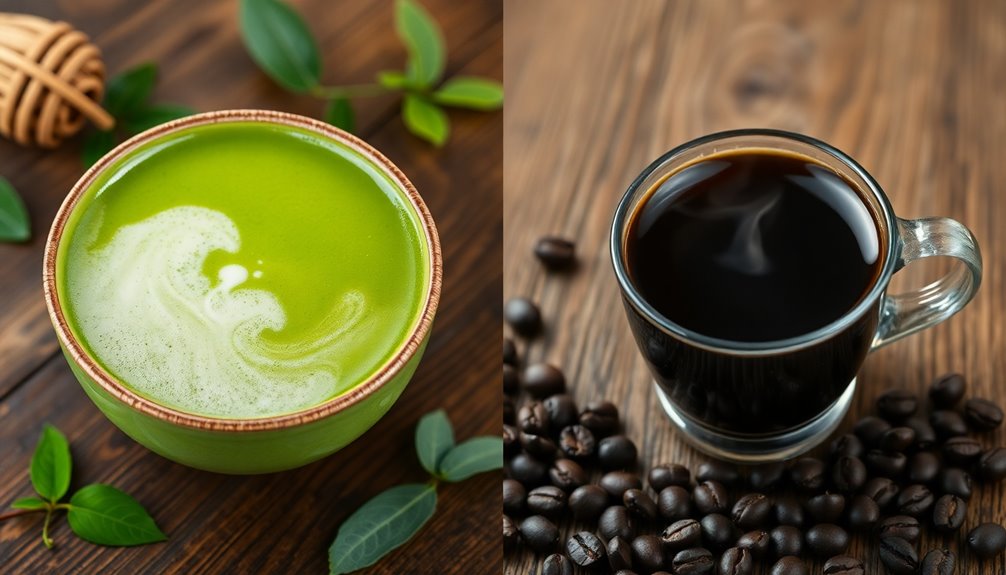
Energy-boosting beverages like matcha and coffee can greatly influence your mental performance. Both drinks have unique properties that can enhance your cognitive function and concentration levels, but they do so in different ways.
Coffee, rich in caffeine, delivers a quick energy surge. This immediate boost can sharpen your focus and improve alertness, making it a popular choice for individuals needing a rapid pick-me-up. Studies suggest that caffeine may enhance specific cognitive tasks, particularly those requiring sustained attention. However, the effects can vary depending on individual tolerance and consumption levels, and excessive intake may lead to jitters or anxiety, which could hinder mental performance.
On the other hand, matcha offers a more gradual energy release. It contains L-theanine, an amino acid that promotes relaxation without drowsiness. This combination can lead to improved concentration levels, allowing you to maintain focus over extended periods. Research indicates that L-theanine can help reduce stress and improve cognitive performance, especially when combined with caffeine found in matcha. Moreover, proper activation of glutes can also play a role in enhancing overall body performance and cognitive function.
Ultimately, your choice between matcha and coffee may depend on your personal preferences and specific needs. If you're looking for a quick boost, coffee might be your go-to. However, if you prefer sustained focus without the crash, matcha could be a better fit. Understanding how each drink affects your mental performance can help you make informed choices for your daily routine.
Effects on Physical Endurance
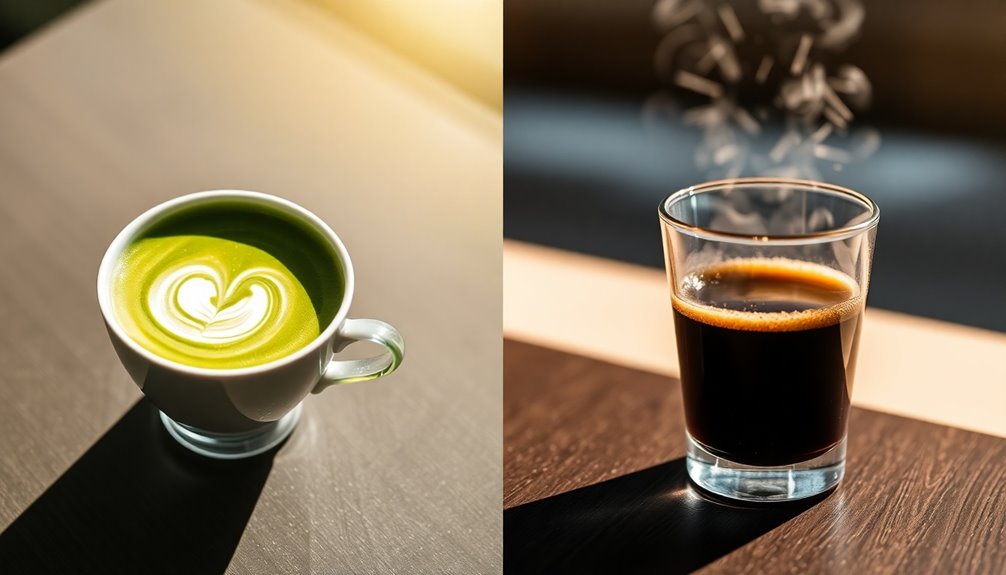
The effects of matcha and coffee extend beyond mental performance; they also play significant roles in physical endurance. If you're looking to boost your athletic performance, both beverages can enhance your energy levels, but they do so in different ways.
Matcha, rich in L-theanine, offers a more sustained energy release. This means you're less likely to experience a sudden crash, allowing you to maintain high energy levels throughout your workout. Studies suggest that athletes who consume matcha may experience improved endurance and reduced fatigue during prolonged exercise.
On the other hand, coffee provides a quick energy boost thanks to its higher caffeine content, which can enhance short bursts of exertion. This makes it a popular choice for those engaging in high-intensity workouts, where immediate energy is pivotal.
Here's a quick comparison of what you might experience:
- Long-lasting energy: Matcha helps maintain energy over longer periods, ideal for endurance activities like running or cycling.
- Quick energy spike: Coffee gives you that immediate jolt, perfect for strength training or sprinting.
- Reduced fatigue: Matcha can help you push through those last challenging minutes of your workout without feeling drained.
Additionally, engaging in mind/body exercises can further support your overall energy levels and help manage stress, which is crucial for maintaining optimal performance.
Ultimately, the best choice depends on your fitness goals. Whether you opt for matcha or coffee, both can support your athletic performance while enhancing your overall energy levels. Embrace what feels right for you, and enjoy the journey to greater endurance!
Potential Side Effects
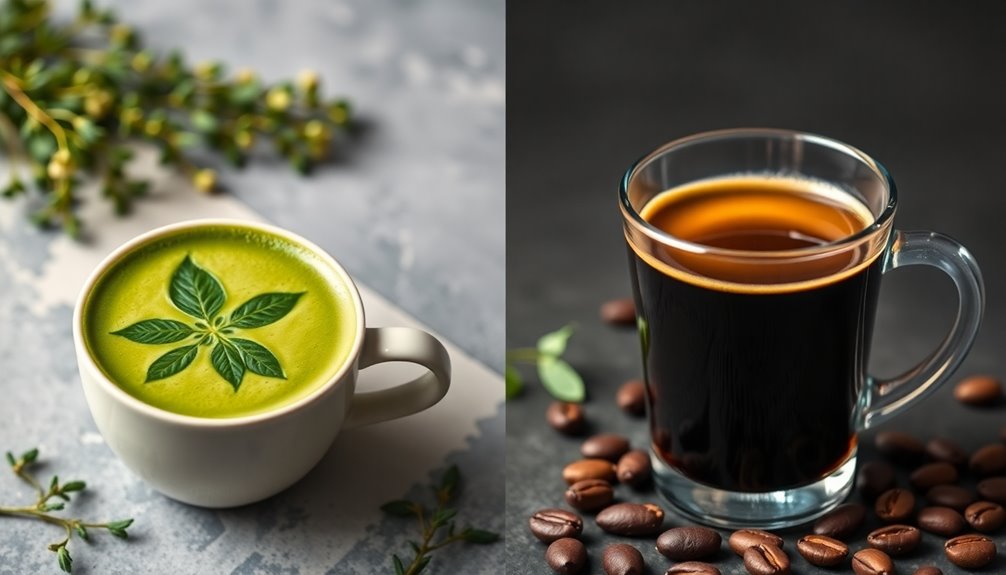
Both matcha and coffee offer unique benefits, but they can also come with potential side effects that users should be aware of. When you consume coffee, the high caffeine content can lead to increased heart rate, anxiety, and digestive issues, especially if you drink it on an empty stomach. If you're sensitive to caffeine, you might experience jitters or insomnia, particularly when your consumption timing isn't aligned with your body's natural rhythms.
On the other hand, matcha contains caffeine as well, but it also has L-theanine, which promotes a more balanced energy boost. However, consuming large amounts of matcha can lead to headaches and nausea due to its high concentration of caffeine and catechins. This is especially pertinent if you're drinking it frequently without considering the long-term effects on your body. Additionally, both beverages may influence gut health, as wheat consumption can cause inflammatory responses that affect overall well-being.
For both beverages, moderation is key. Pay attention to how your body reacts and adjust your intake accordingly. If you're enjoying coffee, consider limiting your consumption to earlier in the day to avoid disrupting your sleep cycle.
Similarly, if you prefer matcha, be mindful of how much you consume and when.
Understanding the side effects of both drinks can help you make informed decisions that align with your lifestyle. By being aware of consumption timing and long-term effects, you can enjoy the benefits of either matcha or coffee while minimizing potential downsides.
Personal Preference Factors
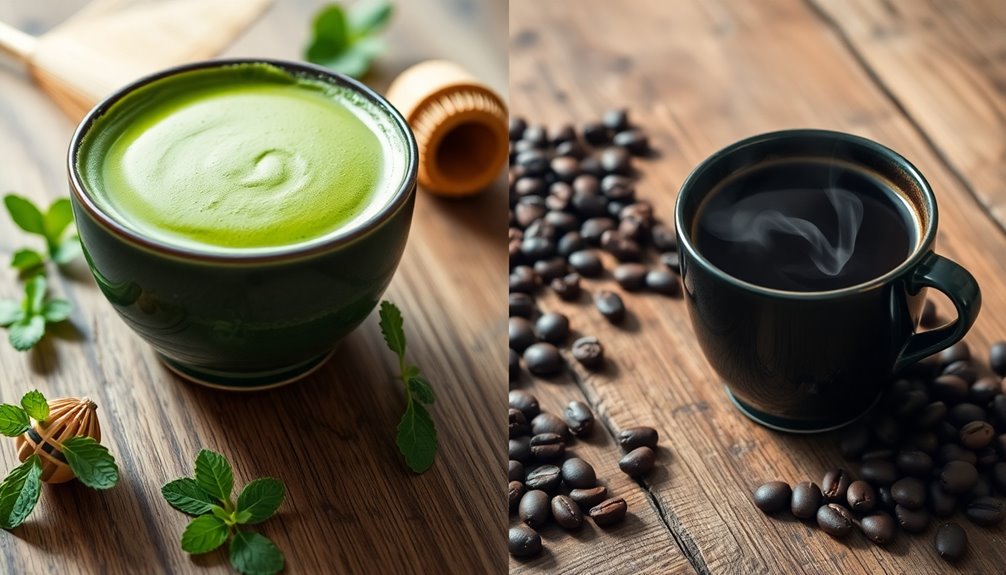
When choosing between matcha and coffee, personal preference plays a significant role in your decision. Your taste preferences can greatly influence which beverage you reach for each morning. Matcha offers a smooth, earthy flavor, while coffee provides a bold, rich taste that many people love. Think about what you enjoy most:
- The calming aroma of a freshly brewed cup
- The vibrant green hue of matcha whisked to perfection
- The comforting ritual of sipping your favorite drink
Brewing methods also come into play. If you appreciate the art of coffee-making, you might enjoy exploring various techniques like pour-over, French press, or espresso. Each method brings out different flavor profiles, allowing you to experiment and find what you love best.
On the other hand, matcha requires a different approach, often involving a bamboo whisk and a ceremonial bowl, creating a unique experience that some find relaxing and meditative.
Additionally, consider convenience. If you're on the go, coffee might be your go-to choice, as it's quick to prepare and easy to find. Matcha can require a bit more time and care, but many enjoy the ritualistic aspect of preparing it. Moreover, both beverages can impact your overall wellness, with natural supplements like NeuroPure supporting healthy nerve function and energy levels.
Ultimately, there's no right or wrong choice; it's all about what resonates with you. Whether you lean towards the vibrant green of matcha or the deep flavors of coffee, both can provide energy and enjoyment in different ways.
Frequently Asked Questions
Can Matcha or Coffee Cause Dehydration?
Both matcha and coffee can impact your hydration balance due to their caffeine content. While they might cause mild diuresis, the overall effect on hydration isn't significant if consumed in moderation. In fact, they can contribute to your daily fluid intake.
Just be mindful of how much you drink; if you overindulge, you might feel a bit dehydrated. Staying aware of your body's signals helps maintain a healthy balance.
How Do Preparation Methods Affect Energy Levels?
When it comes to energy, you really can't judge a book by its cover. Preparation methods play an important role in how your body absorbs caffeine. For instance, brewing coffee can enhance caffeine absorption, while steeping matcha can elevate antioxidant levels.
Depending on how you prepare your drink, the effects on your energy and overall well-being can vary noticeably. It's all about finding what works best for you!
Are There Any Long-Term Effects of Consuming Matcha or Coffee?
When you consume matcha or coffee regularly, you might notice some long-term effects. Studies suggest that both can enhance cognitive function and focus, but coffee may elevate heart health risks if overconsumed.
Matcha, rich in antioxidants, can boost metabolism without the jitters. Balancing your intake of either can lead to positive outcomes, but moderation is key to maintaining overall well-being.
It's always best to choose what aligns with your lifestyle and health goals.
Which Drink Is Better for Workouts in Hot Weather?
When you're sweating it out in the heat, hydration levels become essential for your performance. Both drinks can play a role, but you'll find matcha's gentle caffeine boost helps with temperature regulation while supporting endurance.
Coffee might give you an immediate jolt, but it can lead to dehydration. Choosing matcha may foster a sense of community among those who appreciate its health benefits, making your workout experience enjoyable and fulfilling.
Can Matcha or Coffee Interact With Medications?
When considering whether matcha or coffee can interact with medications, it's important to look at potential interactions. Both beverages contain compounds that might affect medication safety. For example, caffeine can enhance or inhibit the effects of certain drugs.
It's best to consult your healthcare provider about any specific medications you're taking. They can give you personalized advice to make sure you stay safe while enjoying your favorite drinks. Always prioritize your health!
Conclusion
In deciding between matcha and coffee for energy, consider your personal goals and preferences. While coffee offers a quick caffeine boost, matcha provides sustained energy with added health benefits. You might worry that matcha lacks the same immediate kick, but its unique combination of caffeine and L-theanine promotes a calm alertness that can enhance focus without the jitters. Ultimately, both can energize you, so it's about finding the right fit for your lifestyle and body.

